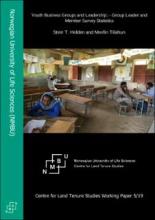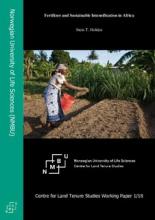Land Library
Bienvenue dans la bibliothèque du Land Portal. Explorez notre vaste collection de ressources en libre accès (plus de 74 000), comprenant des rapports, des articles scientifiques, des articles de recherche, des publications évaluées par des pairs, des documents juridiques, des vidéos et bien plus encore.
/ library resources
Showing items 10 through 18 of 127.We assess the extent of access and degree of participation by smallholder tenants in the land rental market in Malawi. Our study is based on three rounds of nationally representative Living Standards Measurement Surveys collected in 2010, 2013 and 2016, from which we construct a balanced panel.
Continued strong population growth in already densely populated rural areas in parts of Sub-Saharan Africa makes it harder for youth to choose agriculture as their main source of income. We investigate whether near landless youth still can access rented land as a complementary source of income.
The paper discusses the link between commons as they might have been used in
prehistoric Norway and the rules concerning the exploitation of the commons as
found in the oldest known legislation for regions of Norway, Gulating Law and
We study how social preferences and norms of reciprocity are related to generalized and particularized trust among members of youth business groups in northern Ethiopia. Members of these groups are recruited among land-poor rural youth.
We assess the spatial and intertemporal change patterns of farmland prices using per hectare minimum willingness to accept (WTA) sales and rental prices in Malawi.
This working paper is an output from the research project “Youth Business Groups for Sustainable Development: Lessons from the Ethiopian Model” that is funded by Research Council of Norway under the NORGLOBAL2 research program for the period 2019-2022.
This working paper is an output from the research project “Youth Business Groups for Sustainable Development: Lessons from the Ethiopian Model” that is funded by Research Council of Norway under the NORGLOBAL2 research program for the period 2019-2022.
The paper investigates the important role of fertilizer to enhance sustainable intensification and food security in Sub-Saharan Africa based on a multi-disciplinary literature review.
Continued high population growth in already densely populated rural areas in parts of Sub-Saharan Africa makes it harder for youth to choose agriculture as their main source of income. We investigate whether near landless youth can still access rented land as a complementary source of income.









